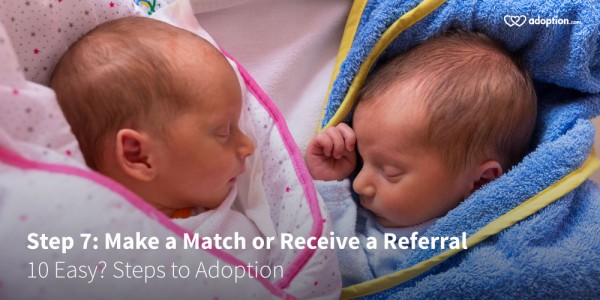You’ve gotten past the halfway point! Now there’s a real child out there who just might be the one you’ve been waiting for. Now you are at the stage, “receive a referral.”
In private domestic adoption, prospective adoptive parents are often matched with women (and sometimes their partners) who are pregnant and considering adoption for their unborn children. You could be matched early on in a pregnancy, or you could be matched days before delivery. Some parents are open to baby-born situations, in which new mothers wait until they have given birth to choose families for their newborns.
When you match, remember that a pregnant woman is not yet a birth mother. She’s an expectant mother, just like any other pregnant woman in the world. Most of the time, you will have the opportunity to talk to an expectant mother on the phone or in-person before being chosen. She may have several questions for you, or your social worker or adoption professional may lead the discussion.
The expectant mother is likely just as nervous as you are! Remember to talk about anything important to you. In our first call with the young woman who became our son’s birth mother, I made it a point to mention that I have a disability because I didn’t want that sprung on her. We chatted about our lives, asked about how her pregnancy was going and learned about her family. When we were in the process again the second time, we wanted to make it clear that we wanted an open adoption. We had been living in one with our son, and it was important to us that our daughter have that available too. Overall, just try to be yourselves.
While you’re matched, do try to talk to the expectant mother as often as she would like. She may need to know more about you to feel comfortable with her decision. Or, she may not want much contact at all. Let her set the pace, and make sure that you follow through with any promises or schedules made. Always remember—this woman is not “your” expectant mother. She’s the expectant mother with whom you’re matched.
In foster adoption, matching varies from county to county. Your county may have formal match meetings, where the child’s caseworker meets with you and explains the situation, or you may simply receive a call stating, “We have this child for you. What do you think?” A match may take hours, days, or months, depending on the situation. Some situations seem to be “hurry up and wait!” You may receive a call about a newborn baby, for example, who needs placement right away. But “right away” may mean something different to the social worker than it does to you.
If the children are already in a foster home, or in the home of a relative who cannot adopt them, you may visit them over a period of weeks. This gives you all a chance to get to know one another and determine if you are all the right fit. While you are in this phase, make sure to get as much background information as you can. Unfortunately, it is not uncommon for social workers to gloss over or even omit pertinent information. If there are certain behaviors or health conditions that you do not feel you can handle—and it’s absolutely OK to admit that—ask the social worker (and if you can, the current foster parents) if any of those behaviors or conditions are present. Always make sure to ask if the child has any health conditions or requires any medication. Social workers are often overworked and may not remember everything about each child. Reach out to other foster parents in your community, either in real life or online, for information about what you should be asking and learning.
In international adoption, you generally receive a referral for a child who is in a foster home or orphanage. You will usually receive a picture and some basic information, including some medical information, about the child. You may be allowed a certain amount of time to review the medical information. As part of your home study, your agency may have helped you line up a pediatrician who has experience with adoption. If not, now is the time to find one. You can often have a pediatrician who specializes in adoption read over the medical files and look for any possible red flags, such as health issues and developmental delays.
Once you match, one of the first questions you’ll have is: Who am I going to tell? Some people choose to keep matching a total secret. Some choose to tell the world. Most seem to go for something in between. It is difficult to announce to the world that you have a match, and then have to announce later that, no, you really didn’t have a match. We had to do that twice. But for us, the idea of keeping everything a secret was just too much. I’m one of those people who needs to talk about everything, process it all and get support. Ultimately, only you can choose which approach is best for you.
Do you feel there is a hole in your heart that can only be filled by a child? We’ve helped complete 32,000+ adoptions. We would love to help you through your adoption journey. Visit Adoption.org or call 1-800-ADOPT-98.

